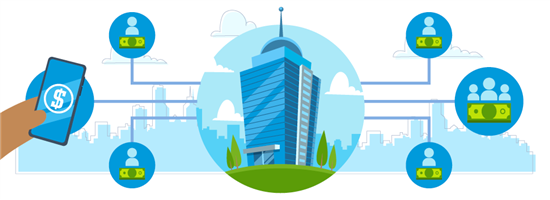Fundrise Review: Is It Legit?
Fundrise lets you invest in real estate with just $10. But is it any good? Find out in this review if it's worth it and legit.
 | |||
Invest in Real Estate with $10+ | |||
Overall Score | 4.0 | ||
Minimum Deposit | 5.0 | ||
Commissions and Fees | 4.0 | ||
Customer Service | 3.0 | ||
Ease of Use | 5.0 | ||
Liquidity | 3.0 | ||
Pros and Cons
- Just $10 to start
- Strong past performance
- Passive investing
- Illiquid investment
- Unknown future returns
Bottom Line
Good way to invest in real estate with low fees and no income requirements
Fundrise is among the pioneers that made real estate investing accessible, even to the average person (aka non-accredited investor), with just a minimum of $10.
Aside from funds based on real estate properties and loans, Fundrise also offers a fund for private tech companies.
However, is it the right choice for you?
Learn more with this detailed review.
Note: This is a testimonial in partnership with Fundrise. We earn a commission from partner links on CreditDonkey.
Can you really make money with Fundrise?
Yes, you can make money with Fundrise by investing in its real estate, private credit, or venture capital funds. You can receive profits either through periodic dividends or fund price appreciation at the end.
According to the current track records of Fundrise's clients, you can potentially achieve a 44% cumulative net return after 5 years.[1]
But as with any investment, note that past performance does not guarantee future results.
Invest in Real Estate with $10+
- Only $10 minimum investment
- Get a diversified portfolio of real estate projects across the US
- Open to all investors
What is Fundrise?
 |
| © CreditDonkey |
Fundrise is a real estate and venture capital investment platform. Initially, Fundrise focused on real estate properties, but it now extends its offerings to include venture capital and private credit (or private lending).
Ben Miller, the co-founder and CEO of the company, started Fundrise in 2012 with the idea to make real estate investing accessible to everyone.
The minimum investment in Fundrise is only $10. It is open to all types of investors who are U.S. residents 18 years or older.
Here are some Fundrise stats-to-date:[2][3]
| Active investors | 385,000+ |
| Active real estate projects | 225 |
| Completed real estate projects | 222 |
| Real estate portfolio value | $7+ billion |
| Dividends paid to investors | $361+ million |
| Venture capital portfolio | 21+ assets, $110+ million raised |
Best Place for Beginners to Invest in Real EstateSelect your state to become a real estate investor
How does Fundrise Work?
Fundrise works just like a mutual fund, but for alternative assets mainly real estate.
At Fundrise, you're not directly investing in an individual asset like a house, loan, or private company. Instead, you're investing in a fund managed by Fundrise with these as the underlying.
Here are the 3 ways to invest in Fundrise:
- Auto-diversified portfolios
Earn passive income through automatically diversified portfolios. Fundrise's portfolios can either be composed of real estate, private credit, or venture capital funds.There are 4 investment plans with different asset allocations depending on your goal. You can change your plan anytime.[4]
Types of Investment Plan Goal Supplemental Income Regular income from dividends Long-Term Growth Income from long-term asset appreciation Balanced Investing A mix of long-term appreciation and dividend earnings Venture Capital Invest in top-tier private tech companies before it goes public - Fundrise Pro
Customize your investment plan and invest in specific funds by subscribing to Fundrise Pro for $10/month or $99/year.[5]Some of the funds you can pick include the Flagship Real Estate Fund (Real Estate), Income Real Estate Fund (Private Credit), or Innovation Fund (Venture).
- Fundrise iPO (internet Public Offering)
Directly buy shares of Fundrise while it is still a private company and earn money upon its exit event, such as an IPO or M&A. Only those with $500+ capital are eligible to invest.
You can either do a one-time investment or set up recurring deposits to further automate your investments.
How do people make money on Fundrise?
You can earn money at Fundrise in two ways:[6]
- Quarterly dividends
Receive quarterly dividends resulting from loan interest payments and rental income of leased properties. - Appreciation in asset value
Gain income as the net asset value (NAV) prices of your Fundrise funds increase over time.
At Fundrise, you can also reinvest your dividends automatically.
Earn Passive Income with Real Estate
Invest in real estate with Fundrise. $10 minimum investment
What is the Average Return in Fundrise?
Fundrise annual returns were between -7.45% to 22.99% from 2017 to 2023, with an average income return of 4.81%.
Out of these 7 years, 24 quarters had positive returns, while 4 quarters experienced a negative return. In comparison, stocks and public REITs had 7 quarters of negative returns during the same period.
Here's a breakdown of Fundrise's average annualized returns (after the fees are subtracted) per year:[7]
| 2014 | 12.25% |
| 2015 | 12.42% |
| 2016 | 8.81% |
| 2017 | 10.63% |
| 2018 | 8.81% |
| 2019 | 9.16% |
| 2020 | 7.31% |
| 2021 | 22.99% |
| 2022 | 1.50% |
| 2023 | -7.45% |
Fundrise vs. Traditional REITs and Stocks:
Based on the 7-year average income returns, Fundrise (4.81%) has outperformed the dividend yields from public REITs (4.21%) and public stocks (2.03%).
Here's the historical total returns for Fundrise, public REITs, and public stocks:
| Fundrise[1] | Public REITs | Public Stocks | |
|---|---|---|---|
| 2017 | 10.63% | 9.27% | 21.83% |
| 2018 | 8.81% | -4.10% | -4.38% |
| 2019 | 9.16% | 28.07% | 31.49% |
| 2020 | 7.31% | -5.86% | 18.40% |
| 2021 | 22.99% | 39.88% | 28.71% |
| 2022 | 1.50% | -25.10% | -18.11% |
| 2023 | -7.45% | 11.48% | 26.29% |
Fundrise is the better option if the sole basis is dividend gains and costs, as it has a higher historical average income return and lower management fees compared to REITs. However, REITs may be a better choice if you want greater liquidity, as you can buy and sell REIT shares anytime on the stock exchange.
Invest in Real Estate with $10+
- Sign up in minutes; no complicated paperwork
- $10 minimum investment
- No income requirements
- Multiple investing plans tailored to your goals
- Completely passive investment
- Low 1% annual fee
My Experience with Fundrise
Here, I'll share my personal Fundrise experience and returns. I started investing with Fundrise in February 2019. Since then, I've invested $12,943 total by making steady auto deposits each month.
As of end of December 2023, my account value is $13,442.77. This is $499.35 in total returns with an average annual return of 1.5%. The total advisory fees is $46.
Here's how it breaks down by year. I've also included how much were from dividends and appreciation.
| Year | Annual Return | Dividends | Appreciation | Total returns (net of fees) |
|---|---|---|---|---|
| 2019 (from Feb) | 6.1% | $49.77 | $53.24 | $103.01 |
| 2020 | 7.6% | $67.28 | $196.30 | $263.53 |
| 2021 | 27.1% | $142.22 | $1,365.50 | $1,506.72 |
| 2022 | 1.0% | $429.55 | -$317.95 | $111.60 |
| 2023 | -8.4% | $157.06 | -$1,642.73 | -$1,485.67 |
In the 5 years, Fundrise has been volatile with highs and lows. 2021 was an outstanding year, but like mentioned earlier, don't expect every year to perform like that.
Since I am in the Long-Term Growth plan, it's still unclear how much appreciation I'd see in a few years when more projects mature. I plan to keep my investments for the long haul to ride out the downs.
So yes, you could make more with other investments, but remember that all investments carry some risk. It depends on your risk appetite and your time horizon.
Fundrise Fees
Fundrise charges an all-in 1% management fee as follows:
- 0.85% annual asset management fee (that goes towards operating costs of the projects)
- 0.15% annual advisory fee (can be waived in certain circumstances)
However, this does not apply to the Fundrise Innovation Fund which has a flat 1.85% annual management fee.[8]
For Fundrise Pro, the membership fee is $10/month or $99/year (30-day free trial).[9]
This pricing is pretty competitive. However, some of Fundrise's potential costs are not as transparent. Read on to learn more.
Hidden Fees
- 0-2% acquisition fee when Fundrise buys a new asset
- 1% penalty when you redeem shares within five years of investing (No fee in the first 90 days)[10]
- An annual fee of $125 to Millennium Trust Company if you're investing as an IRA[11]
If you're looking for a low fee alternative, check out Groundfloor. The company offers short-term real estate loan projects and has low fees.
Invest in Real Estate with $100
- Short-term real estate investments lasting just 6-18 months
- Open to non-accredited investors
- Low fees
Withdrawing Profits in Fundrise
To withdraw funds from Fundrise, you need to submit a liquidation request. These requests are reviewed quarterly in early April, July, October, and January.
When it is approved, you'll receive an email. Expect funds to be disbursed within 6-10 business days of the redemption date.
When you redeem, the shares you've had for the longest will be liquidated first, following the first in, first out (FIFO) rule.
Fundrise funds are designed to be held long-term, typically 5 years or more. So, you can't easily sell and withdraw anytime you want, unlike publicly traded REITs.
Earn Passive Income with Real Estate
Invest in real estate with Fundrise. $10 minimum investment
Fundrise Pros & Cons
Pros:
- Just $10 to start
- Don't need to be an accredited investor
- Automatically diversified portfolio
- Quarterly dividend distributions
- Completely passive investing
- Available as IRA
- Option to customize portfolio through Fundrise Pro
- See Fundrise Deal >>
Cons:
- Long-term investment (typically five years or more)
- Cannot choose individual assets; limited to funds only
- Potential liquidation fees
- Lack of fee transparency
- Can be volatile
Read on to learn more.
Best Alternatives to Fundrise
Invest in Real Estate with $100
- Short-term real estate investments lasting just 6-18 months
- Open to non-accredited investors
- Low fees
Online Alternative Investments
- Exclusive access to private market investments
- Wide range of alternative investments like art, real estate, legal financing, and more
- Goal-based investing for growth or income
- Minimums starting from $10,000
How to Get Started
Want to let your money work through Fundrise? Here's how:
- Create an account
View special offers and sign up accordingly. - Pick a plan
Answer some questions about your investment goal. Then, Fundrise will automatically assign an investment plan for you. However, you can also change your plan anytime.If you want more control over your portfolio, subscribe to Fundrise Pro.
- Fund your account
Link a checking account to your Fundrise account or set up a wire transfer. Processing may take several days, but after that, you can start investing. Minimum is $10. - Earn money
Fundrise investors are paid dividends every quarter and at the end of investments when the assets mature.
Fundrise Investment Plans
 |
| © CreditDonkey |
After signing up, you'll need to select one of the 4 investment plans to determine how Fundrise will invest your money.
Here's how each strategy differs:
- Supplemental Income: This focuses on properties that create cash flow from rent or interest. You will earn more dividends here, so select this if your goal is passive income.
- Long-Term Growth: This focuses on properties that are expected to appreciate in value. You'll earn less dividends now, but the potential long-term returns could be the highest.
- Balanced Investing: This approach creates a more balanced mix of income and growth properties. You earn money through both dividends and appreciation.
- Venture Capital: This portfolio invests in high-growth private tech companies (some examples include Uber, Unity, and Canva). Returns are expected to be in the form of long-term appreciation.
You can change your investment plan at any time, so you're not stuck with your initial choice. Changing will only affect future investments and will not rebalance your current positions.
Types of Accounts
Fundrise supports the following accounts:
- Personal taxable account
- Joint account
- Traditional or Roth IRA (through Millennium Trust Company)
- Certain entity accounts (Trusts, Limited Liability Companies, Limited Partnerships, C Corporations, and S Corporations)
Is Fundrise Safe?
Yes. Fundrise portfolios are made up of qualified offerings regulated by the Securities and Exchange Commission (SEC) so they follow strict reporting requirements.
Additionally, Fundrise reduces your risk through extensive due diligence, thorough underwriting, and a conservative approach, positioning their portfolio to sustain economic downturns.[13]
Fundrise also has an A+ rating with the Better Business Bureau (BBB), which suggests its trustworthiness and reliability. [14]
To keep your personal information safe, Fundrise uses bank-level security. This includes 2-factor authentication, AES bit symmetric key encryption, and Transport Layer Security (TLS).
But all investing carries some risk. Fundrise has done well since its establishment, but there is no guarantee it'll continue to do so.
How Fundrise Compares
See how Fundrise stacks up against the competition, including other real estate investing platforms.
Fundrise vs Groundfloor
Groundfloor is a good option if you're looking for short-term real estate investments. The projects last only 6 to 18 months.
Groundfloor works a little differently. Instead of investing in equity, you are lending money to borrowers for quick fix-and-flip housing projects. When the house is renovated and then sold, you'll get your investment back (along with interest).
So far, the average returns to date is 10%.[16] Each loan has a fixed interest rate and projected term, so you know beforehand what to expect.
Flywheel Portfolio, Groundfloor's newest offering, combines hundreds of short-term real estate loans into a single investment. You get instant diversification across these loans, with repayments distributed weekly as loans are paid back.
 |  | |
| Visit Site | Visit Site | |
Fundrise | GROUNDFLOOR | |
|---|---|---|
Invest in Real Estate with $10+ - | Invest in Real Estate with $100 - | |
Benefits and Features | ||
| Annual Fee | 0.5-1.0% management fee with Flywheel Portfolio | |
| Minimum Deposit | ||
| Phone Support | ||
| Live Chat Support | ||
| Email Support | ||
| Investment Types | Commercial, single family, multi-family, industrial | |
| Accredited Investor Requirements | ||
| Dividends | Choose quarterly payouts or auto reinvest | Weekly repayments with the Flywheel Portfolio |
| Investment Period | 5+ years (with opportunities to liquidate on a quarterly basis) | |
| Visit Site | Visit Site | |
| Terms Apply. | Terms Apply. | |
GROUNDFLOOR: Investments carry risk and may lose value. Not an offer or solicitation to purchase securities. Please consult the Offering Circular and related SEC filings before making an investment decision. | ||
Fundrise vs Crowdstreet
Crowdstreet is one of the largest commercial real estate marketplaces. This platform is only open to accredited investors (unlike Fundrise, which is open to everyone).
They focus on high quality commercial real estate deals. You can either choose your own deals, or invest in a fund that includes multiple projects. Most of the deals require a $25,000 minimum investment.
Crowdstreet is popular because of its impressive returns. Since 2014, it has averaged a very strong annualized IRR of 15.0%.[17]
 | ||
| Visit Site | Learn More | |
Fundrise | CrowdStreet | |
|---|---|---|
Invest in Real Estate with $10+ - | Invest in Private Equity Real Estate - | |
Benefits and Features | ||
| Annual Fee | $0 platform fee; Sponsor fees vary for each deal | |
| Minimum Deposit | ||
| Phone Support | ||
| Live Chat Support | ||
| Email Support | ||
| Investment Types | Commercial, single family, multi-family, industrial | Commercial, multi-family, industrial, land |
| Accredited Investor Requirements | ||
| Dividends | Choose quarterly payouts or auto reinvest | Some properties generate monthly or quarterly dividends |
| Investment Period | 5+ years (with opportunities to liquidate on a quarterly basis) | |
| Visit Site | Learn More | |
| Terms Apply. | ||
Fundrise vs Yieldstreet
Yieldstreet is a platform for alternative investments. Instead of only real estate, you can also invest in other alternative assets like art, luxury vehicle leasing, and litigation financing.
Non-accredited investors can invest in Yieldstreet's Alternative Income Fund. This is a collection of a lot of different alternative assets. It's an easy way to get a little of everything with only one investment.
If you are accredited, you can pick your own individual offerings. They usually start at $10,000 minimum. Yieldstreet's investments have an average IRR of 9.6%. [18]
 |  | |
| Visit Site | Visit Site | |
Fundrise | Yieldstreet | |
|---|---|---|
Invest in Real Estate with $10+ - | Online Alternative Investments - | |
Benefits and Features | ||
| Annual Fee | 1.5% management fee for the Alternative Income Fund; Fees vary for individual investment offerings (usually 1-2%) | |
| Minimum Deposit | $10,000 minimum for the Alternative Income Fund; Individual investment offerings typically starts at $10,000 | |
| Phone Support | ||
| Live Chat Support | ||
| Email Support | ||
| Investment Types | Commercial, single family, multi-family, industrial | Residential & commercial real estate, sports car leasing, art financing, marine vessels and deconstruction, supply chain financing, litigation financing |
| Accredited Investor Requirements | None for the Alternative Income Fund; Must be accredited investor for individual investment offerings | |
| Dividends | Choose quarterly payouts or auto reinvest | Alternative Income Fund pays dividends quarterly; can choose to auto-invest or cash payout |
| Investment Period | 5+ years (with opportunities to liquidate on a quarterly basis) | 5 years for Alternative Income Fund (with opportunities to liquidate on a quarterly basis); Varies for individual offerings |
| Visit Site | Visit Site | |
| Terms Apply. | ||
What the Experts Say
Beginners can start investing in real estate with just a little bit of money. Find out if that's a good idea.
As part of our series on real estate investing and passive income, CreditDonkey asked a panel of industry experts to answer some of our readers' most pressing questions:
- Is real estate crowdfunding a safe or risky investment?
- What is the best way for beginners to invest in real estate?
Here's what they had to say:
Bottom Line
 |
Typically, investing in real estate requires large amounts of money.
However, be aware that the real estate market can be volatile too, so it's best if you can invest for the long term. Also remember that accessing your funds will be more limited, and there could even be a penalty in the first 5 years.
If you're willing to tie up your money up and start small, diversifying into real estate through Fundrise might be worth the investment.
Invest in Real Estate with $10+
- Only $10 minimum investment
- Get a diversified portfolio of real estate projects across the US
- Open to all investors
Invest in Real Estate with $100
- Short-term real estate investments lasting just 6-18 months
- Open to non-accredited investors
- Low fees
Next steps: View portfolio plans, terms and details
The publicly filed offering circulars of the issuers sponsored by Rise Companies Corp., not all of which may be currently qualified by the Securities and Exchange Commission, may be found at www.fundrise.com/oc.
References
- ^ Fundrise. Client Returns, Retrieved 4/29/2024
- ^ Fundrise. About Us, Retrieved 12/23/2023
- ^ Fundrise. Real Estate Strategies, Retrieved 12/23/2023
- ^ Fundrise. What is the difference between the Investment Plans?, Retrieved 05/27/2024
- ^ Fundrise. How much does Fundrise Pro cost?, Retrieved 01/18/24
- ^ Fundrise. How can I earn returns on my investment?, Retrieved 2/8/2024
- ^ Fundrise. Explore client performance over time, Retrieved 2/2/23
- ^ Fundrise. What are Fundrise's fees?, Retrieved 5/1/2024
- ^ Fundrise. Discover these features and more, with Fundrise Pro, Retrieved 2/8/2024
- ^ Fundrise. Are there any costs associated with liquidating shares?, Retrieved 2/8/2024
- ^ Fundrise. What are the fees associated with investing through my IRA?, Retrieved 2/8/2024
- ^ Fundrise. How do I withdraw funds (request a liquidation)?, Retrieved 2/8/2024
- ^ Fundrise. How It Works, Retrieved 10/28/2023
- ^ Better Business Bureau. Fundrise BBB Rating & Accreditation, Retrieved 4/3/2022
- ^ Securities and Exchange Commission. SEC Charges Fundrise Advisors, LLC for Paying Content Creators to Solicit Clients in Violation of the Cash Solicitation Rule, Retrieved 4/30/2024
- ^ Groundfloor. Groundfloor for investors, Retrieved 1/3/2024
- ^ Crowdstreet, Marketplace Performance, Retrieved 05/27/2024
- ^ Yieldstreet. Historical Performance, Retrieved 1/3/2024
Invest in Real Estate with $10+
- Only $10 minimum investment
- Get a diversified portfolio of real estate projects across the US
- Open to all investors
Invest in Rental Homes with $100+
Browse rental home investments for free. No bank account required
Online Alternative Investments
- Exclusive access to private market investments
- Wide range of alternative investments like art, real estate, legal financing, and more
- Goal-based investing for growth or income
- Minimums starting from $10,000
Invest in Real Estate with $100
- Short-term real estate investments lasting just 6-18 months
- Open to non-accredited investors
- Low fees
Write to Anna G at feedback@creditdonkey.com. Follow us on Twitter and Facebook for our latest posts.
Note: This website is made possible through financial relationships with some of the products and services mentioned on this site. We may receive compensation if you shop through links in our content. You do not have to use our links, but you help support CreditDonkey if you do.
Fundrise, LLC ("Fundrise") compensates CreditDonkey Inc for new leads. CreditDonkey Inc is not an investment client of Fundrise.
|
|
| ||||||
|
|
|
Compare:








